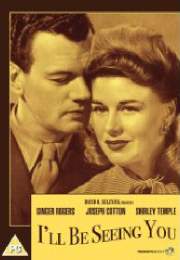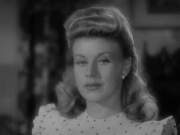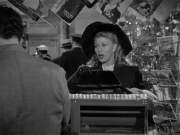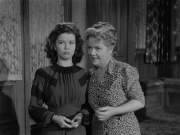I'll Be Seeing You
Introduction
Two strangers meet on a train and get talking, but both hide secrets that they don't want to share with the other and ruin their budding relationship. Sergeant Zachary Morgan (Joseph Cotton) is a Pacific Campaign veteran who is recovering from a bayonet wound and also suffering from post traumatic stress disorder, or battle shock as it was then known. He's been recuperating in a military hospital but has been given leave over Christmas to get out in a first step at rehabilitation. Mary Marshall (Ginger Rogers) has been released from prison on a Christmas furlough where she's in the middle of a six-year sentence for manslaughter.
The two hit it off on the train and when Mary mentions she's getting off at the next stop to stay with her Aunt over Christmas, it turns out that Zach is also staying in the same town to visit his sister and Mary gives Zach her phone number.
Zach, however, checks into the local YMCA as he just wanted to be near Mary and the two start to see each other, starting off with dinner with the Marshalls and their young daughter Barbara (Shirley Temple). Zach is quick to explain to Mary that he is recuperating from combat injury, but holds back from a full confession on his psychological problems. Mary, meanwhile, is too ashamed of her circumstances to come clean and spins a story about being a travelling saleswoman.
Mary's situation is complicated by the curiosity of her cousin Barbara, who only knows that Mary has been in prison and not of how she ended up there. Their relationship changes subtly as they get to know each other better, Barbara ashamed of herself when it becomes clear what happened.
As time goes by, Zach and Mary become closer and it gets harder to tell the truth as they start to fall in love.
Visual
The picture suffers a little when dark, but overall in remarkably good condition when you consider its age. I didn't really notice any visible print damage and was quite impressed by some of the detail, although a lot of the sets did look exactly like sets.
Audio
A Dolby Digital 2.0 Stereo soundtrack that plays entirely through the centre speaker. There are no subtitles.
Overall
When you look back at old films, and here you're going back over 60 years, there always seems to be a kind of simplistic optimism prevalent. The stories are uncomplicated and the outcome always positive. Sometimes though, they can surprise too.
What I was quite surprised at with this film was the circumstance of the two central characters. To have the male lead as suffering from post traumatic stress disorder was a brave move in my view during a wartime period, an admission during a time that many men were away fighting for their country that they too could suffer from the same issues as Zach Morgan. It's not just glossed over either, it's a central issue to the film and despite this condition not being fully understood at this time, his suffering is clear and sympathetic. It was therefore doubly surprising to have the female lead in Ginger Rogers having served jail time for manslaughter. Obviously it wasn't deliberate, as female heroines can't commit pre-meditated crimes and it was all a drunken bloke's fault, but it was a brave move all the same.
This is a Christmas film with a difference. There is the all-American family with mom and apple pie, welcoming the two outcasts into their home with no prejudice. You also have Shirley Temple as the naïve growing teenager whose curiosity and well-meaning nature pours salt on a festering wound of shame, completely by accident. It's not as if you can't see the turn of events coming, or the ending, but it's actually quite a nice gentle ride there overall.
Not exactly typical love story material for the era, but it works well all the same, even if it is Sunday afternoon TV fodder these days.



































Your Opinions and Comments
Be the first to post a comment!